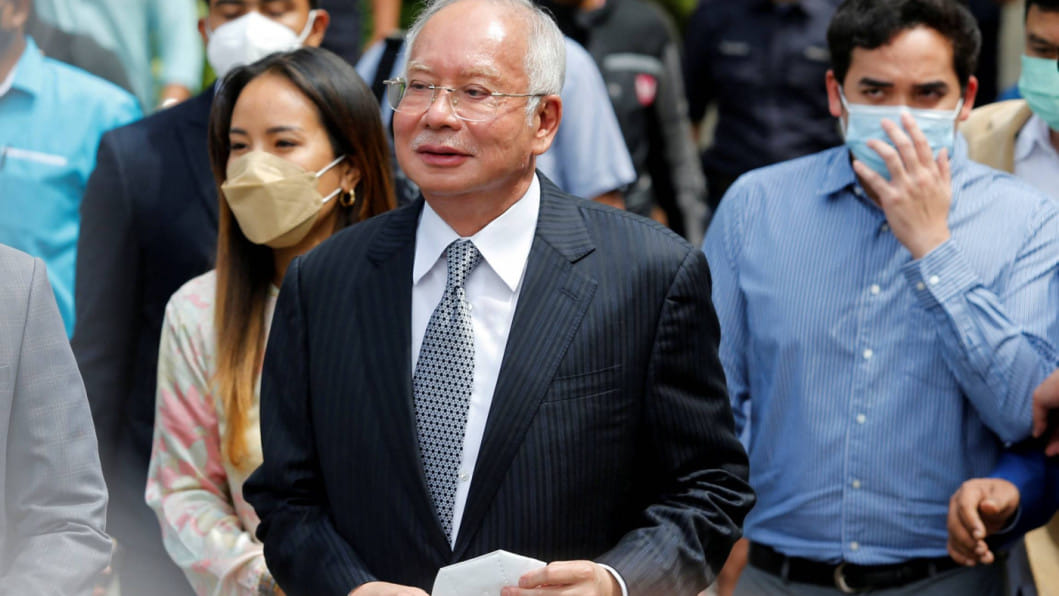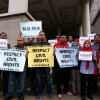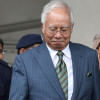Malaysia’s government system under pressure in wake of Najib verdict

Malaysia's legal system is facing a severe challenge from the followers of former Prime Minister Najib Razak, who want him freed via royal pardon from a sentence of 12 years in prison on seven counts of abuse of power, money laundering, and criminal breach of trust for steering millions of dollars into his own pockets from an offshoot of the failed 1Malaysia Development Berhad investment fund, which collapsed in 2016 from mismanagement and corruption.
Despite his conviction, Najib remains one of the country's most potent political figures, an influential kingmaker in the United Malays National Organisation (UMNO), the country's biggest political party. As it has become increasingly apparent that successive courts would affirm his conviction, the political pressure has grown to try to find a way to keep him out of prison.
Hundreds of pro-Najib protesters, clad mostly in black, marched to the Istana, the national palace, requesting an immediate pardon in the wake of his shock sentencing. A small band of protesters also gathered outside the Federal Court, hurling abuse at the chief justice for her verdict sending Najib to prison.
Mahathir Mohamed, the former prime minister who grimly pursued Najib with allegations of criminality that played a major role in bringing down the ruling Barisan Nasional coalition in the 2018 election, predicted Najib would likely receive a royal pardon from Malaysia's King Al-Sultan Abdullah, and would also be waived from paying the 210 million ringgit fine imposed on him earlier this week by the country's top tribunal.
There is concern, for instance, over the king's close relationship with Najib, providing him with tacit support during his trial by having him as a guest at palace functions. Najib is one of four so-called Orang Besar, or elders holding the title Orang Kaya Indera Shah Bandar, which he inherited from his late father, a former prime minister. This is a direct connection to the Pahang Royal household which the present king heads.
However, while Najib has considerable sympathy in the ethnic Malay community, there is also widespread anger over perceptions that he and the top UMNO officials have indulged in widespread looting of the government over decades, extending considerably beyond 1MDB to a plethora of expensive government contracts and government-linked companies.
Thus, any immediate pardon could possibly be the end of UMNO electorally. Many Malaysians are proud that their country's legal system has finally come through with integrity. A pardon for Najib would destroy trust in the legal system and symbolise Malaysia as a country where justice is a two-tier system, treating VIPs differently from the rest of the people.
Najib's imprisonment has severely weakened the so-called "court cluster" of top UMNO cadres who face charges in the wake of Najib's 2018 arrest. UMNO President Ahmad Zahid Hamidi's own court case for looting a charity is quickly coming to a conclusion, and he is likely to face the same fate as Najib, should he be convicted. Najib's wife Rosmah Mansor will hear the verdict on her court case on September 1.
The Coalition for Free and Fair Elections (Bersih) has so far collected at least 50,000 signatures in an online petition to the king requesting he not pardon Najib, who faces four more trials for allegedly using his position to obtain bribes totalling 32 billion ringgit (USD 7.16 billion) and 21 charges of money laundering involving the accounts from the failed government-backed investment fund 1MDB, which collapsed in 2016 with at least USD 5.4 billion lost to corruption and mismanagement.
In yet another case, Najib is charged along with Mohd Irwan Serigar Abdullah on six charges of criminal breach of trust involving 6.64 billion ringgit of government funds in their capacities as finance minister and secretary-general of the treasury. He is also charged together with former 1MDB CEO Arul Kanda Kandasamy with falsifying a 1MDB audit report.
Najib's followers have continued to allege that Justice Mohd Nazlan, who presided over Najib's conviction in 2020, had a conflict of interest and have demanded that the Malaysian Anti-Corruption Commission investigate him. When the appeals court wouldn't allow Najib's counsel Hisyam Teh Poh Teik to present new evidence, Najib attacked Chief Justice Tengku Maimun directly, seeking her recusal after claiming she had a conflict of interest due to anti-Najib comments made by her husband on social media after the Barisan's loss in the 2018 general election. Legal scholars have largely dismissed these complaints.
The Najib legal team is also complaining that the final judgment was leaked to social media before the appeal hearing was completed. Despite that, opinion around the legal profession considers that the grounds the Najib defence team planned to present on final appeal would not cut it with the full bench and was almost certain to be rejected – as it was.
The strange antics that occurred, with Najib repeatedly swapping legal teams, which appeared to be a last-minute attempt to delay the proceedings, were regarded as having been orchestrated with seeking a pardon in mind. This is supported by the changed narrative from the Najib camp over the last week, claiming he was not getting a fair trial.
Najib is now claiming that two judges within two courts had reason to be prejudiced against him. His team is also arguing that the court's action in barring UK-based Queen's Counsel C Jonathan Laidlaw from representing the former premier was unjust. These arguments have all been rejected by the courts, but are potentially persuasive arguments for a pardon. In the words of Barisan Nasional Secretary-General Zambry Abdul Kadir, "Najib should have been given the space and judicial process based on (the) existing legal provisions."
Article 42 (1) of the Malaysian Constitution grants the king the authority to issue a judicial pardon. Further, Article 42 (4) (b) states that it must be on the advice of the Pardons Board, made up in this case by the prime minister, three other members, with the king presiding as chairman.
The procedure is long and cumbersome, with some legal opinions stating that the person receiving a pardon must have served at least some of the sentence prior to asking for clemency. Other legal opinion has said that as Najib is still facing criminal trials over other matters, it would potentially be necessary to grant a number of pardons separately to Najib to fully clear him.
However, there is a precedent, and there may be nothing to stop the king in granting a full and comprehensive pardon. A pardon was hastily prepared and granted to Anwar Ibrahim after the 2018 general election, with Mahathir as the prime minister driving the process over just a few days.
If Najib doesn't apply for a royal pardon within the next 14 days, he will be automatically disqualified from his Pekan parliamentary seat. Consequently, there is a very high probability that his legal team is preparing a plea for a royal pardon at this very moment.
Najib only has one other option and that is to request a judicial review of his appeal. This is unlikely to achieve anything, so an appeal for a pardon appears a last hope. His troubles have left Prime Minister Ismail Sabri looking much stronger and able to wait before calling a general election.
By distancing himself from Najib and Zahid, Ismail Sabri hopes to face the coming election with a clean slate concerning corruption. However, the depth and spread of the quickly emerging LCS naval ship scandal is yet to fully surface and implicate senior members of his cabinet. Ismail Sabri doesn't have much choice in the matter, according to political pundits.
The imprisonment of Najib will not take him quietly out of the national scene. He still has civil and criminal court cases to attend, which will ensure he will remain in the public eye. The VIP conditions Najib finds himself in the Kajang Prison may very well allow him to communicate with the outside world. Najib's imprisonment hasn't closed the book on him just yet.
Murray Hunter is a Southeast Asia-based development specialist and a frequent contributor to Asia Sentinel.
Copyright: Asia Sentinel 2022

 For all latest news, follow The Daily Star's Google News channel.
For all latest news, follow The Daily Star's Google News channel. 








Comments